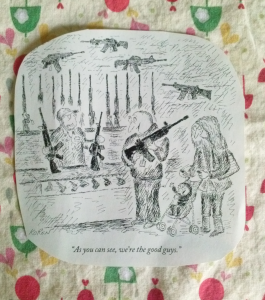ALH: So, I worship with two churches. I attend Trinity UMC in downtown Durham on Sunday mornings. When I am not juggling mommy work on Sunday nights, I attend Durham Resurrection Community, which now meets behind Motorco, Sundays at 5:00. Ryan Quanstrom is the pastor who started DRC, and he recently noted for all the (web-reading-evangelical or liberal) world in a lovely comment below this article that I “told him” to start DRC. He graciously agreed to visit with me about church, love, and Jesus.
ALH: So, you may not know that subtle (dorky) musical reference in this blog post title, because, well . . . you are a lot younger than I am.
RQ: While I am younger, they still make tambourines. I happen to enjoy folk music and Bob Dylan is one of the greatest.
ALH: Bob Dylan sang that? My mom listened to rock, but you grew up listening mostly to Christian rock, right? Which mainstream Christian-ish group were you most surprised I had not heard of? That has been a point of confusion for us – musical references I am clueless about.
RQ: I did grow up listening mostly to Christian rock. When I was about 6 my uncle bought my older brother a cassette of Petra’s “Back to the Streets.” He and I played it non stop. In high school I was in a Christian rock band and went to every concert I could. I’m not sure that I remember a specific group. I know that I often reference The O. C. Supertones, Bleach, and All Star United. I think their music has been incredibly formative to my theology. All Star United has a great song called “Smash Hit” that critiques the whole Christian culture industry.
ALH: Goodness knows we need that . . . When we first started talking about DRC, we called it Fullsteam Church. Why did you think it might be a good idea to offer Jesus to people who hang out at bar fellowship spots like Fullsteam?
RQ: I would like to be able to offer Christ to all people. I guess with Fullsteam it seemed like a population that was either being ignored or it was being courted by the large churches that have tons of money. Part of the draw was that I believed (and still believe) that many younger Christians are tired of watching performances of Church. I also find them theologically problematic because they train people to be consumers instead of participants.
The Church needs to be actively offering people Jesus because we are religious beings. If the church does not offer Jesus, then others will offer some sort of fake salvation. I don’t know if you have heard this, but Mystery Brewing Company offers “Beer Church” on Sundays. They get a group together to drink and talk about different aspects of beer. Other people find their religion at concerts, at sporting events, and in feasts. In Sochi they have a giant religious event going on where competition reigns and the human being is celebrated. If the church does not offer folks Jesus, then they have nowhere to turn but to something as unimportant as throwing a pig skin.
At the heart of it, I might think that offering Jesus to people is a good idea because as a six year old I thought that was what we were supposed to do. As Petra sang, “We gotta take this message. Back to the street!”
ALH: Oh. I love the image of you singing that when you were six. Beer Church . . . That’s another blog post. So, I can’t imagine it is easy being my pastor. I can be pretty critical. One of the things I suggested (gently, I hope?) was that you focused too much on the sin of pride in your sermons. That was a few years ago. Was that helpful at all?
RQ: Being your pastor is a gift! You love Jesus too much for it to be difficult. You are critical, but you know I appreciate the guidance. Your suggestion was spot on! Pride is an issue with which I struggle. I am blessed to have someone who can see that I was working on myself in the sermons. Pastors should be more concerned with bringing a message to their congregation than working through their own stuff in a sermon. We should have mentors, spiritual directors, or psychologists for that.
I have found that suggestion quite helpful. It pushed me to think further about the origins of sin. At Duke you hear of concupiscence or cor incurvatus as the definition of sin. I had always taken that as too much self love, or pride. Instead it should be understood as a disordered self love. That is broader and has opened up new ways to talk about our sin. Sin can also be too little self love. This seems like a stretch to some. But, how unfaithful of us is it to discredit God’s love for us. If God loves us, who are we to not follow suit and love us? Shouldn’t we love the objects of God’s love?
ALH: As a Nazarene, you are called to witness to holiness, even to perfection! Does love of self have any role in bringing one closer to Jesus? If so, have you seen any need for this sort of witness in your congregation (whether at DRC or with people you meet while serving at a local restaurant)?
RQ: Self love definitely plays a role in our relationship to Jesus. I believe Kierkegaard (or Barth or Bonhoeffer I don’t remember) points out that in the parable of the Good Samaritan the first question is “Who is my neighbor.” After the story Jesus responds with, “Which of these three do you think was a neighbor to the man who fell into the hands of the robbers?” The expert in the law replied, “The one who had mercy.” Jesus says, “Go and do likewise.”
We often interpret that “do likewise” to mean that we are to treat others as the Samaritan had. Certainly, we should, but I don’t think that is the full message. I believe that we mistakenly place ourselves as healthy people walking along the path. We aren’t always. Sometimes we are beat up on the side of the road and we are supposed to love our neighbor, we are to love the one who has mercy on us. And, the one who has mercy on us is God. It can be hard to live into that mercy. To trust ourselves to be rightly merciful to ourselves. The love of God is similar to self love. For some people their Christian discipline in learning to love God entails learning to love themselves with mercy.
Over the past 5 years I have had to learn just how much people need to learn to love themselves. I do not know if my generation is weaker or more honest about their weaknesses. I do know we are hurt. Folks suffer from all kinds of issues that stem from a lack of self love. While this is true in my church, it is more apparent in the service industry. In five years I have had four friends kill themselves. I do not want to over simplify suicide, but at least part has to do with a lack of self love. The church needs to address this. We need to proclaim the scandal of the Gospel that the neighbor we are supposed to love is one who picks up our mostly dead body, carries us to the inn, pays for our recuperation, and then pays for our health. That story is far more powerful than the way it is normally told.
We need the story of God’s love for us told in a compelling way. Too often it is a bait and switch type love. “God loves you with all that God is. That is why He is going to burn you for eternity.” We also interpret the salvation story as contractual. “God died for you. Salvation is a gift. Now prove to God and to yourself that you are worthy of that gift through a life of paranoid obedience.” How is that good news? I am all for holy living, but it begins with the inspiration from God. Too many of us are afraid to trust God to save us. We want to control our salvation. So even after knowing about God’s love we try to take control through our actions. That’s faithlessness. A faithful person accepts the gift knowing that there is no way to pay back the debt. We are eternally indebted and we should be grateful.
I see it like when I buy someone’s dinner. I don’t tell them I am going to do it. I just buy it cause I like buying people dinner. I absolutely hate when someone thinks that they now owe me something. I did not act expecting something in return. I wanted to show that person that I loved them. Sometimes I think our faint attempts at holy living are a lot like an annoying person trying to pay me back for that meal I bought them. I do not need to be repaid. Just go live a happy life. We would be better off if we trusted God to save us. Then we might love our neighbors and ourselves properly.
ALH: I know you love John Wesley, but you also have been very influenced by Orthodox theology, and Russian literature. Have there been ways that either or both have helped you think about holiness and love?
RQ: It’s strange, when I think of Wesley, I mostly think of my Dad’s teaching. “If God can raise the dead, then cannot God make someone holy?” “Is God powerless to defeat sin?” I am a Nazarene and a holiness preacher. I believe that God’s love is more powerful than the sin of humanity. I also believe that God makes us a new creation. I might be wrong, but I think that is one of the most hopeful doctrines ever. God does not simply look the other way and have us remain in sin, God heals us.
As I think of the Orthodox, I am reminded of an articulation of God’s love for us. Many are familiar with the Christ Hymn in Philippians: Jesus emptied himself. Some Orthodox say that this mode of love is normative for the inner relationship of the Trinity. The love that Jesus shows for humanity is the same love that Jesus shows for the Holy Spirit and the Father. God the Father has self emptying love for the Spirit and for the Son. God the Holy Spirit has self emptying love for the Son and the Spirit. They exist in an eternal relationship of self emptying love.
Another way to articulate this is that the three persons of the Trinity exist in an eternal relationship where they are trying to make room for one other. Their self emptying is not one where they no longer exist. They are becoming more of the Father, Son, and Spirit by making space for one another. Some say that it is in the space created inside of the Trinity that creation sprang up. All of creation is only possible because they Trinity is making room for one another. In making room for one another, they are making space for us.
I find this idea helpful because in a world where people kill themselves, cut themselves, suffer from eating disorders, etc. we need more affirmation of the goodness of life. The church needs to affirm people. We can call people to repentance, but that call includes teaching people to love properly. We might all be a bit more holy if we learned to make room for one another instead of shaming one another. I believe people can envision making room for another person in a healthier way than they can with the language of self denial.
ALH: You talked about this idea of making space once when we were meeting at Beyu Café, and I immediately wanted to write it down and put it up around my house. There is another story you told me that has been of pastoral solace. You have a way of talking with men in authority who believe strongly against women’s ordination. Would you please say more here about that?
RQ: I don’t recall the exact phrase that I have used. Typically I go to Peter’s sermon on Pentecost where he cites Joel. God pours out his spirit on all people, on sons and daughters and they prophesy. If the Holy Spirit inspires a woman to prophesy, shouldn’t men be willing to listen? It seems odd to me that that Holy Spirit would inspire someone to prophesy, but then the church tells them to be quiet in church. Perhaps some men are afraid of letting women speak in church because they do not actually want to hear from the Holy Spirit. Isn’t that a scary thought? I want to remind them of Gamaliel and fighting against God. I want to remind them that the Holy Spirit showed up to a group of uncircumcised gentiles! Circumcision isn’t necessary for inspiration, so women can preach.
I say it because I want the Church to be open to God’s instruction. I really do not understand why men are threatened by women. Women led the nation of Israel. God became a human being through a woman. If we want to experience the fullness of God, then we need to listen to women too. I am eager to know God and I do not believe the church ought to stifle the Spirit.
ALH: How have you seen Durham change in the last 5 years? What do you celebrate? What do you wish you could change?
RQ: Oh wow. It has gotten richer. We have a bunch of rust belt folks coming down here and finding a new home. This gives them space for creativity. I love seeing the ways in which Durham is proud to be Durham. While I rejoice in those things, I am not sure that the “success” that Durham is currently experiencing is reaching to all people in the city. If I could change anything it would probably be something along food scarcity. I would love to find a way to create terraced community gardens along the 147 on ramps and bridges. While I say food scarcity, that also has economic and racial tones that must be addressed. Durham is still racially divided, we need to find creative ways to inhabit the fullness of God’s reign when we no longer will be divided by race.
ALH: Again, that is a giant issue for another post . . . Especially as it relates to neighborhoods around Fullsteam and Motorco, right? So, for now, what song would you sing if you could play the guitar exactly like you do in your wildest dreams, as loud as you could sing it?
RQ: As though I do not already do that. Sometimes on road trips I go hoarse from listening to Bleach. They have a great song called “Sufficient/Knocked Out.” Towards of the song the bottom drops to only guitar and ride cymbal. The lead singer breaks in with “And I will sing at the top of my lungs. I will dance even if I am the only one. And I hope that we’ll never be apart. I will sing and I hope it heals my heart.”
ALH: Bleach. Now that is a new one too. I know my girls are happy when they sing at the top of their lungs in the shower. Thank God for healing, huh? Given that your mom and dad will likely read this blog post, because they adore you and support you in so many ways, what would you like most to say to them here about their support of your work with DRC?
RQ: They are incredibly supportive. They love me and are proud of me, and they make sure to tell me that every time we talk. I guess I would say thank you for baptizing me as an infant. My parents made sure to baptize all three of their children as infants. They understood that we are God’s and they are our caretakers. They have always been loving and they have always made space for us. My parents have always made following Jesus an attractive thing. They continue to be faithful examples of God’s love. Beyond the words, the money, and the prayers they offer an example of how to follow God. That is something for which I am extremely grateful. I am truly blessed, and for all that I can merely say, “Thanks.”
ALH: Amen.




